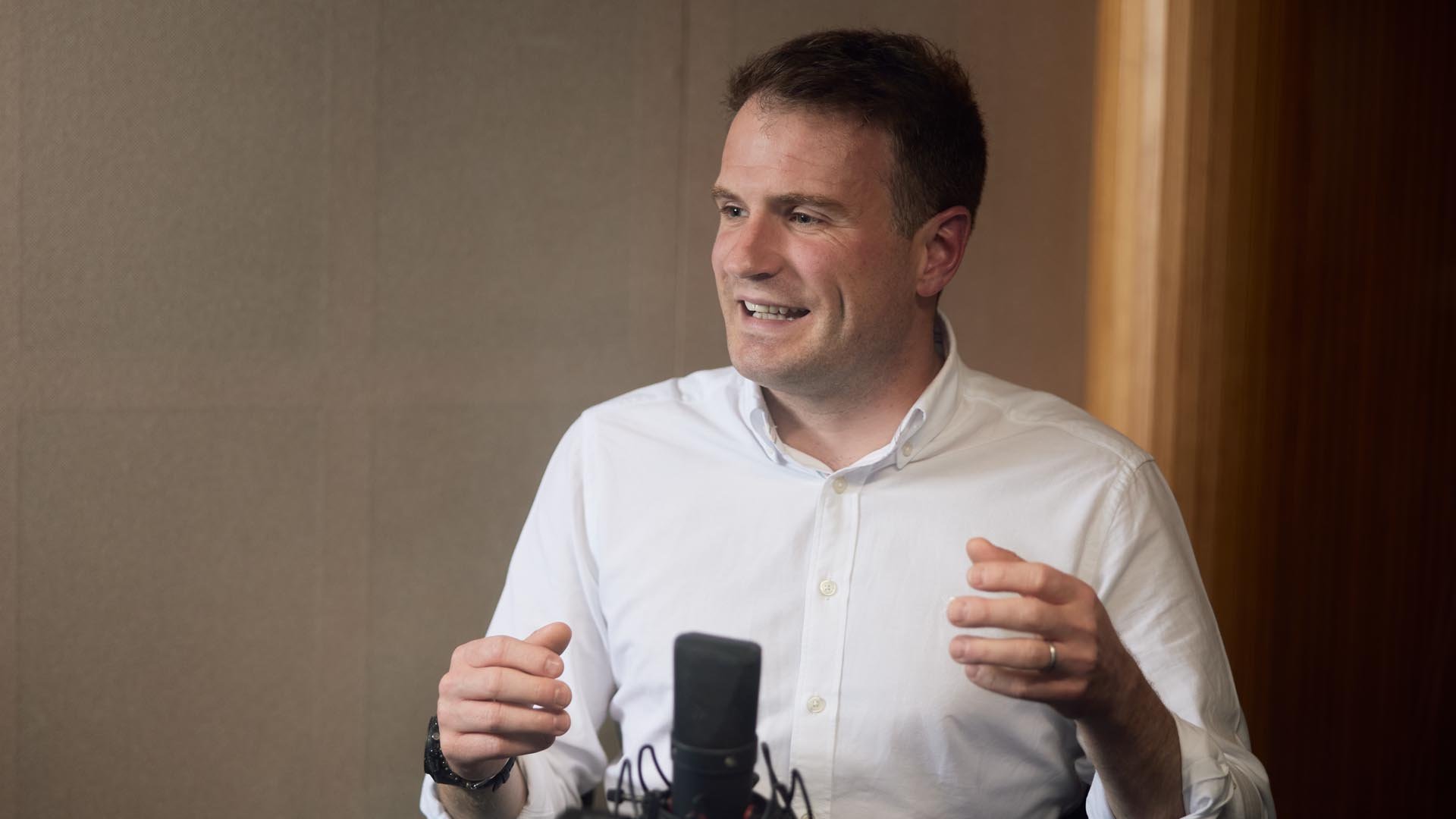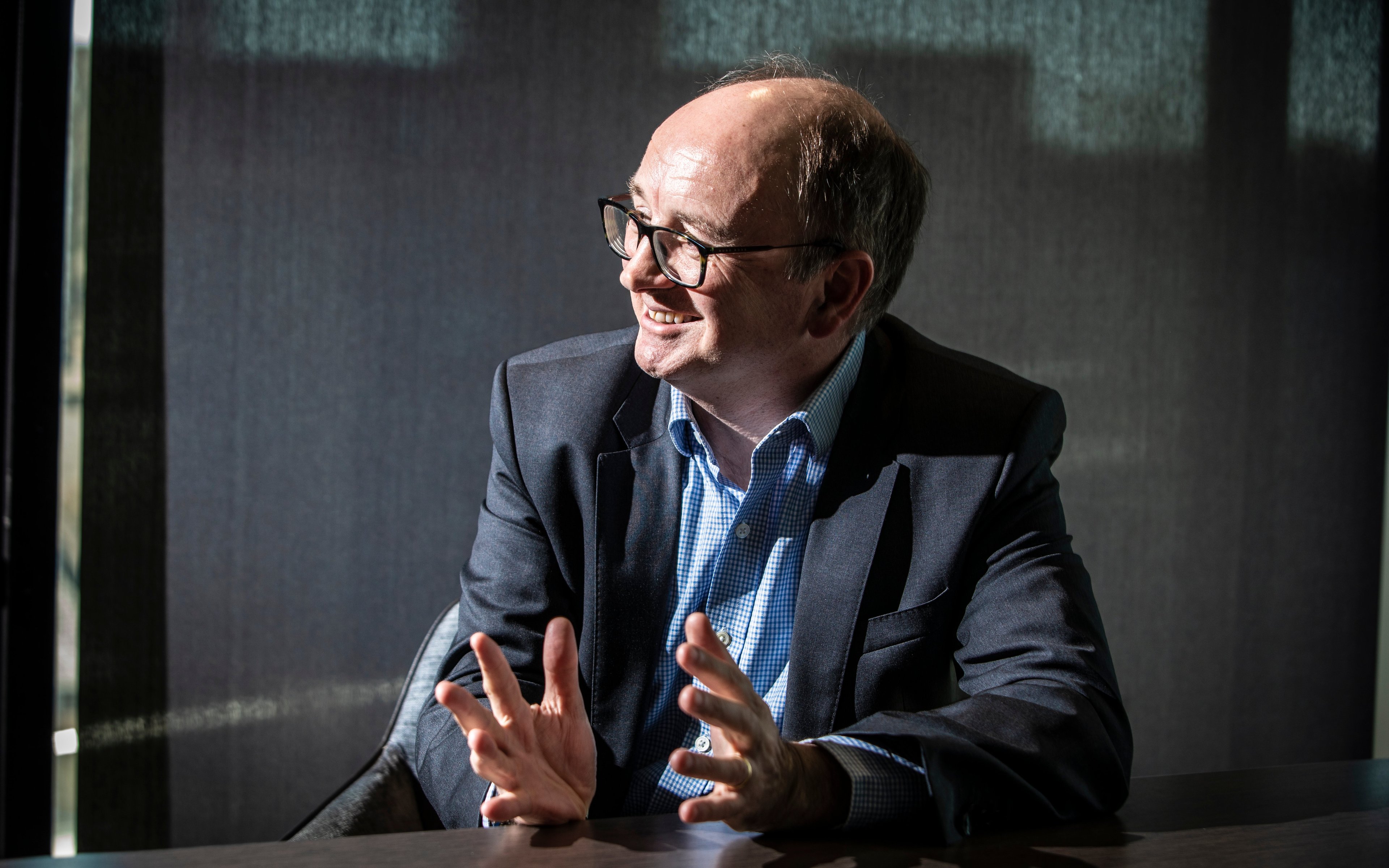Key Points
- From Microsoft to Hermès, partner Mark Urquhart explains what convinced him to invest in key growth stocks over his 27-year career
- He discusses the importance of risk-taking maverick founders
- And he reveals why he thinks the glucose monitoring specialist Dexcom is one of the most exciting companies in business
Listen to the podcast on Spotify and Apple Podcasts
All investment strategies have the potential for profit and loss, capital is at risk. Past performance is not a guide to future returns.
Long-term growth investing has an enduring aim: to find companies that increase their performance and value over many years. Baillie Gifford has stayed true to that goal over the decades, but the kinds of companies we have backed keep changing.
When Mark Urquhart joined Baillie Gifford in 1996 as a trainee, neither Google, the iPod, nor even wifi existed, let alone some of the cloud computing and app-based services he’s since invested in.
“The advent of the internet, connectivity, the whole idea that we’ve all got supercomputers in our pockets, changed everything – everything was disruptable,” Urquhart reflects in a recent episode of Short Briefings on Long Term Thinking.
In the podcast, the Baillie Gifford partner shares key lessons he’s learned in the years since abandoning academia for finance.
Lesson one: chase faster growth
The first dates from his early days on the US team. “Back then we didn’t have desktop computers,” he says. “I think we had one terminal, which had internet access, at the end of the desk, which people treated with suspicion. I was seen as the chap that might understand this new-fangled technology called ‘software’.”
Before long, Urquhart pitched his superiors on the merits of investing in Microsoft.
“Here was a company that had 90 per cent market share, was growing really effortlessly because every computer sold had Windows installed, had huge operating margins and was led by a visionary in the form of Bill Gates.”
The US team had a reputation for thinking tech stocks were “not for them”, so Urquhart was surprised when the partner in charge bought the stock on his recommendation. Its subsequent strong performance helped establish Urquhart’s reputation and taught him a lesson: “That you could get these companies which could grow very quickly, that could double again and again.”
As Urquhart explains, over subsequent decades, he and his colleagues have become more ambitious in the type of growth they pursue.
“A good growth company then would be a 10 to 15 per cent compounder,” he says. “A company growing at 15 per cent for five years is attractive: it will double.
“But a company growing at 35 per cent for five years will go up nearly five-fold. So it’s that sort of difference in the opportunity, which is hugely exciting, and something we seek to systemically exploit.”
Lesson two: look for maverick leaders
In 1999, Urquhart moved to the Japan team, a switchover he didn’t relish because of a misconception that it represented a shift to “a backwater 10 years into a bear market”.
“I had gone in with the impression that Japanese firms are staid and boring, and they won’t change,” he says. But meetings with the leaders of some of the country’s smaller-sized companies led him to reverse his view. They included Takao Yasuda, founder of the discount retail chain Don Quijote.
“His idea was that shopping should be chaotic, should be madness,” Urquhart says. “Through western eyes that made no sense: we wanted Marks and Spencer’s and regimented underpants. But actually, shopping as entertainment was brilliant, and the Japanese loved it and lapped it up.”
This appreciation for chief executives who combine seeing the world in unusual ways with an ability to deliver on the operational performance to achieve their ambitions later influenced his investments in Amazon, Tesla and other entrepreneur-led companies.
“We’re looking for special individuals: mavericks, madcaps, people who will take risks and do things differently, will see the world differently, Urquhart says. “So from the Japanese startups to the Elon Musks of the world, for me, there’s quite a connection.”
Lesson three: recognise the disrupters can get disrupted
Over the years, Urquhart has spotted a recurring theme: things can change in unexpected ways leading even the most innovative companies to come undone.
He notes how a historic Baillie Gifford holding, Kodak, went from being one of the world’s largest companies to declaring itself bankrupt in 2012. The company had popularised photography and made movies possible. But it failed to capitalise on its own pioneering work in digital cameras, resulting in others cannibalising its business.
“It’s that classic sort of innovator’s dilemma when an incumbent doesn’t see the opportunity because it has huge existing revenues it wants to protect,” Urquhart explains.
He adds that something similar occurred to Nintendo after Apple launched its App Store in 2008. The move created a giant market for downloadable casual games that ate into sales of Nintendo’s more expensive, cartridge-based titles.
“We managed to get out of its shares in fairly short order,” Urquhart says. “You have to be open-minded sometimes about these companies that are sailing along, that something can come from left field and disrupt the entire business model.”
Lesson four: be adaptable, and look for companies that are likewise
By his reckoning, Urquhart has faced 10 financial crises over his career, ranging from 1997’s Asian slowdown to the current fallout from the war in Ukraine and inflation surge. “Quite often equities take the brunt of it because they are liquid,” he reflects.
As a long-term investor, he adds, you must avoid getting caught up in the panic and rather check if your holdings are still hitting their operational targets. But that doesn’t mean ignoring game-changing events.
“There are times when the macro does invade the micro – where some business models are just hugely disrupted,” he acknowledges. In recent months, he and other investment managers have sold some stocks because interest rate rises and increased living costs had reduced their growth prospects. But there are many others in which he retains confidence, because of their ability to switch course.
“I’d cite something like Netflix, which had a big fall in share price but is now back to growing, has the strongest balance sheet in its industry by a mile, and is doing interesting things in terms of different revenue streams,” he says. He’s referring to the TV streaming service’s new ad-supported plans and account-sharing fees.
“There’s a key point that you want companies which are adaptable.”
The observation also applies to Baillie Gifford. That’s not to suggest the company is about to cease being a long-term growth investor. But as Urquhart explains, we are continuously on the lookout for new sources of growth and wary of complacency.
“The secret to investing,” he concludes, “is to hold your ideas passionately, but lightly.”
Hear this and other Short Briefings on Long Term Thinking episodes on Spotify, Apple and other platforms
Words by Leo Kelion
Risk Factors
The views expressed should not be considered as advice or a recommendation to buy, sell or hold a particular investment. They reflect opinion and should not be taken as statements of fact nor should any reliance be placed on them when making investment decisions.
This communication was produced and approved in June 2023 and has not been updated subsequently. It represents views held at the time of writing and may not reflect current thinking.
Potential for Profit and Loss
All investment strategies have the potential for profit and loss, your or your clients’ capital may be at risk. Past performance is not a guide to future returns.
This communication contains information on investments which does not constitute independent research. Accordingly, it is not subject to the protections afforded to independent research, but is classified as advertising under Art 68 of the Financial Services Act (‘FinSA’) and Baillie Gifford and its staff may have dealt in the investments concerned.
All information is sourced from Baillie Gifford & Co and is current unless otherwise stated.
The images used in this communication are for illustrative purposes only.
Important Information
Baillie Gifford & Co and Baillie Gifford & Co Limited are authorised and regulated by the Financial Conduct Authority (FCA). Baillie Gifford & Co Limited is an Authorised Corporate Director of OEICs.
Baillie Gifford Overseas Limited provides investment management and advisory services to non-UK Professional/Institutional clients only. Baillie Gifford Overseas Limited is wholly owned by Baillie Gifford & Co. Baillie Gifford & Co and Baillie Gifford Overseas Limited are authorised and regulated by the FCA in the UK.
Persons resident or domiciled outside the UK should consult with their professional advisers as to whether they require any governmental or other consents in order to enable them to invest, and with their tax advisers for advice relevant to their own particular circumstances.
Financial Intermediaries
This communication is suitable for use of financial intermediaries. Financial intermediaries are solely responsible for any further distribution and Baillie Gifford takes no responsibility for the reliance on this document by any other person who did not receive this document directly from Baillie Gifford.
Europe
Baillie Gifford Investment Management (Europe) Limited provides investment management and advisory services to European (excluding UK) clients. It was incorporated in Ireland in May 2018. Baillie Gifford Investment Management (Europe) Limited is authorised by the Central Bank of Ireland as an AIFM under the AIFM Regulations and as a UCITS management company under the UCITS Regulation. Baillie Gifford Investment Management (Europe) Limited is also authorised in accordance with Regulation 7 of the AIFM Regulations, to provide management of portfolios of investments, including Individual Portfolio Management (‘IPM’) and Non-Core Services. Baillie Gifford Investment Management (Europe) Limited has been appointed as UCITS management company to the following UCITS umbrella company; Baillie Gifford Worldwide Funds plc. Through passporting it has established Baillie Gifford Investment Management (Europe) Limited (Frankfurt Branch) to market its investment management and advisory services and distribute Baillie Gifford Worldwide Funds plc in Germany. Similarly, it has established Baillie Gifford Investment Management (Europe) Limited (Amsterdam Branch) to market its investment management and advisory services and distribute Baillie Gifford Worldwide Funds plc in The Netherlands. Baillie Gifford Investment Management (Europe) Limited also has a representative office in Zurich, Switzerland pursuant to Art. 58 of the Federal Act on Financial Institutions (“FinIA”). The representative office is authorised by the Swiss Financial Market Supervisory Authority (FINMA). The representative office does not constitute a branch and therefore does not have authority to commit Baillie Gifford Investment Management (Europe) Limited. Baillie Gifford Investment Management (Europe) Limited is a wholly owned subsidiary of Baillie Gifford Overseas Limited, which is wholly owned by Baillie Gifford & Co. Baillie Gifford Overseas Limited and Baillie Gifford & Co are authorised and regulated in the UK by the Financial Conduct Authority.
China
Baillie Gifford Investment Management (Shanghai) Limited
柏基投资管理(上海)有限公司 (‘BGIMS’) is wholly owned by Baillie Gifford Overseas Limited and may provide investment research to the Baillie Gifford Group pursuant to applicable laws. BGIMS is incorporated in Shanghai in the People’s Republic of China (‘PRC’) as a wholly foreign-owned limited liability company with a unified social credit code of 91310000MA1FL6KQ30. BGIMS is a registered Private Fund Manager with the Asset Management Association of China (‘AMAC’) and manages private security investment fund in the PRC, with a registration code of P1071226.
Baillie Gifford Overseas Investment Fund Management (Shanghai) Limited
柏基海外投资基金管理(上海)有限公司(‘BGQS’) is a wholly owned subsidiary of BGIMS incorporated in Shanghai as a limited liability company with its unified social credit code of 91310000MA1FL7JFXQ. BGQS is a registered Private Fund Manager with AMAC with a registration code of P1071708. BGQS has been approved by Shanghai Municipal Financial Regulatory Bureau for the Qualified Domestic Limited Partners (QDLP) Pilot Program, under which it may raise funds from PRC investors for making overseas investments.
Hong Kong
Baillie Gifford Asia (Hong Kong) Limited 柏基亞洲(香港)有限公司 is wholly owned by Baillie Gifford Overseas Limited and holds a Type 1 and a Type 2 license from the Securities & Futures Commission of Hong Kong to market and distribute Baillie Gifford’s range of collective investment schemes to professional investors in Hong Kong. Baillie Gifford Asia (Hong Kong) Limited 柏基亞洲(香港)有限公司 can be contacted at Suites 2713-2715, Two International Finance Centre, 8 Finance Street, Central, Hong Kong. Telephone +852 3756 5700.
South Korea
Baillie Gifford Overseas Limited is licensed with the Financial Services Commission in South Korea as a cross border Discretionary Investment Manager and Non-discretionary Investment Adviser.
Japan
Mitsubishi UFJ Baillie Gifford Asset Management Limited (‘MUBGAM’) is a joint venture company between Mitsubishi UFJ Trust & Banking Corporation and Baillie Gifford Overseas Limited. MUBGAM is authorised and regulated by the Financial Conduct Authority.
Australia
Baillie Gifford Overseas Limited (ARBN 118 567 178) is registered as a foreign company under the Corporations Act 2001 (Cth) and holds Foreign Australian Financial Services Licence No 528911. This material is provided to you on the basis that you are a “wholesale client” within the meaning of section 761G of the Corporations Act 2001 (Cth) (“Corporations Act”). Please advise Baillie Gifford Overseas Limited immediately if you are not a wholesale client. In no circumstances may this material be made available to a “retail client” within the meaning of section 761G of the Corporations Act.
This material contains general information only. It does not take into account any person’s objectives, financial situation or needs.
South Africa
Baillie Gifford Overseas Limited is registered as a Foreign Financial Services Provider with the Financial Sector Conduct Authority in South Africa.
North America
Baillie Gifford International LLC is wholly owned by Baillie Gifford Overseas Limited; it was formed in Delaware in 2005 and is registered with the SEC. It is the legal entity through which Baillie Gifford Overseas Limited provides client service and marketing functions in North America. Baillie Gifford Overseas Limited is registered with the SEC in the United States of America.
The Manager is not resident in Canada, its head office and principal place of business is in Edinburgh, Scotland. Baillie Gifford Overseas Limited is regulated in Canada as a portfolio manager and exempt market dealer with the Ontario Securities Commission ('OSC'). Its portfolio manager licence is currently passported into Alberta, Quebec, Saskatchewan, Manitoba and Newfoundland & Labrador whereas the exempt market dealer licence is passported across all Canadian provinces and territories. Baillie Gifford International LLC is regulated by the OSC as an exempt market and its licence is passported across all Canadian provinces and territories. Baillie Gifford Investment Management (Europe) Limited (‘BGE’) relies on the International Investment Fund Manager Exemption in the provinces of Ontario and Quebec.
Israel
Baillie Gifford Overseas is not licensed under Israel’s Regulation of Investment Advising, Investment Marketing and Portfolio Management Law, 5755-1995 (the Advice Law) and does not carry insurance pursuant to the Advice Law. This material is only intended for those categories of Israeli residents who are qualified clients listed on the First Addendum to the Advice Law.





